De Engels-Amerikaanse dichter en schrijver T. S. Eliot werd op 26 september 1888 geboren in St.Louis, Missouri. Zie ook mijn blog van 26 september 2006. Zie ook mijn blog van 26 september 2007 en ook mijn blog van 26 september 2008 en ook mijn blog van 26 september 2009.
The Waste Land
“Nam Sibyllam quidem Cumis ego ipse oculis meis
vidi in ampulla pendere, et cum illi pueri dicerent:
Sibylla ti theleis; respondebat illa: apothanein thelo.”
- The Burial Of The Dead
April is the cruellest month, breeding
Lilacs out of the dead land, mixing
Memory and desire, stirring
Dull roots with spring rain.
Winter kept us warm, covering
Earth in forgetful snow, feeding
A little life with dried tubers.
Summer surprised us, coming over the Starnbergersee
With a shower of rain; we stopped in the colonnade,
And went on in sunlight, into the Hofgarten,
And drank coffee, and talked for an hour.
Bin gar keine Russin, stamm’ aus Litauen, echt deutsch.
And when we were children, staying at the archduke’s,
My cousin’s, he took me out on a sled,
And I was frightened. He said, Marie,
Marie, hold on tight. And down we went.
In the mountains, there you feel free.
I read, much of the night, and go south in the winter.
What are the roots that clutch, what branches grow
Out of this stony rubbish? Son of man,
You cannot say, or guess, for you know only
A heap of broken images, where the sun beats,
And the dead tree gives no shelter, the cricket no relief,
And the dry stone no sound of water. Only
There is shadow under this red rock,
(Come in under the shadow of this red rock),
And I will show you something different from either
Your shadow at morning striding behind you
Or your shadow at evening rising to meet you;
I will show you fear in a handful of dust.
Frisch weht der Wind
Der Heimat zu
Mein Irisch Kind,
Wo weilest du?
“You gave me hyacinths first a year ago;
“They called me the hyacinth girl.”
––Yet when we came back, late, from the Hyacinth garden,
Your arms full, and your hair wet, I could not
Speak, and my eyes failed, I was neither
Living nor dead, and I knew nothing,
Looking into the heart of light, the silence.
Oed’ und leer das Meer.
Madame Sosostris, famous clairvoyante,
Had a bad cold, nevertheless
Is known to be the wisest woman in Europe,
With a wicked pack of cards. Here, said she,
Is your card, the drowned Phoenician Sailor,
(Those are pearls that were his eyes. Look!)
Here is Belladonna, the Lady of the Rocks,
The lady of situations.
Here is the man with three staves, and here the Wheel,
And here is the one-eyed merchant, and this card,
Which is blank, is something he carries on his back,
Which I am forbidden to see. I do not find
The Hanged Man. Fear death by water.
I see crowds of people, walking round in a ring.
Thank you. If you see dear Mrs. Equitone,
Tell her I bring the horoscope myself:
One must be so careful these days.
Unreal City,
Under the brown fog of a winter dawn,
A crowd flowed over London Bridge, so many,
I had not thought death had undone so many.
Sighs, short and infrequent, were exhaled,
And each man fixed his eyes before his feet.
Flowed up the hill and down King William Street,
To where Saint Mary Woolnoth kept the hours
With a dead sound on the final stroke of nine.
There I saw one I knew, and stopped him, crying “Stetson!
“You who were with me in the ships at Mylae!
“That corpse you planted last year in your garden,
“Has it begun to sprout? Will it bloom this year?
“Or has the sudden frost disturbed its bed?
“Oh keep the Dog far hence, that’s friend to men,
“Or with his nails he’ll dig it up again!
“You! hypocrite lecteur! – mon semblable, – mon frere!”
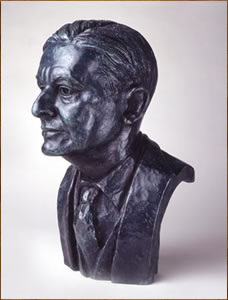
T. S. Eliot (26 september 1888 – 4 januari 1965)
Buste door Celia Scott
De Nederlandse Dichter en schrijver Bart Chabot werd geboren in Den Haag op 26 september 1954. Zie ook mijn blog van 26 september 2006. Zie ook mijn blog van 26 september 2007 en ook mijn blog van 26 september 2008 en ook mijn blog van 26 september 2009.
Eend
disneyland paris bestaat vijf jaar
er valt confetti uit de wolken
we zitten aan de lunch
in het new york hotel
sebastiaan en ik lopen naar het buffet
ik til het deksel op
van een enorme vleesschotel
– pap – vraagt sebas – is dat kip?
van de damp beslaat mijn bril
– that’s duck sir – schiet een ober ons te hulp
het tafelzilver hangt plotseling
op eigen kracht in de lucht
– you mean donald? – vraag ik
wijzend op de eendenborstjes
stilte daalt over de tafels
dan stijgt homerisch gelach op
sebastiaan kijkt niet blij
Hoe ik de herfst uitstelde
het was een van de eerste dagen van september
een vrijdag
honderd procent in orde
strakblauwe hemel
niks op af te dingen
deze lucht was voor mij bestemd
tot om een uur of vier
een vloot regenwolken
de boel kwam zieken
-o nee, daar komt niks van in-
ik bedacht me geen moment
en pakte een vuilniszak
uit het keukenkastje
liep het balkon op
(schoonmaakwoede;
knappe jongen die me tegenhield)
trok de zak open
en deed er één voor één
de wolken in
ziezo, dat was dat
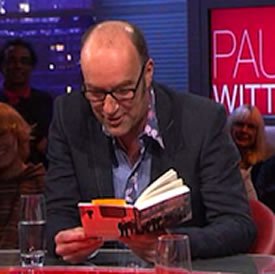
Bart Chabot (Den Haag, 26 september 1954)
De Nederlandse schrijver Thomas van Aalten werd geboren in Huissen bij Arnhem op 26 september 1978. Zie ook mijn blog van 26 september 2007 en ook mijn blog van 26 september 2008 en ook mijn blog van 26 september 2009.
Uit: Stervende diva’s
“Two hearts under a skyscraper
Suede, Stay Together
Terwijl mijn relatie met Candy voortreutelde bleef ik Lorraine bezoeken. In het geheim, diep in de nacht. Zwervend van bed naar bed, in het late verkeer van de buitenstad, het geloei van sirenes. In de verte hoorde ik de goederentreinen razen terwijl de rest van de stad vooral bezig was met slapen. Behalve in het centrum, waar nachtclubs en bordelen rokerig en donker verscholen lagen tussen de gesloten winkels. De rest van de stad had niets door. Zelfs de rest van het land niet.
Hier, buiten de stad, lag het domein. Het stadsdeel waar Lorraine woonde, lag nabij de snelweg. Als het ’s nachts twee uur was geweest, verliet ik het huis van Candy, gelegen in het drukke centrum van de hoofdstad, en vertrok ik naar Lorraine. Lorraine was de nachtelijke engel, de bewaakster van de duistere liefde.
Met mijn Citroën DS was ik precies achttien minuten kwijt om er te komen, veel sneller dan te voet. Lorraine wist meestal niet precies wanneer ik aankwam, het hing er maar net van af. Soms kwam ik nachten achtereen niet. Soms kwam ik nachten achterelkaar.
En als ik er dan was, stonden we meestal uit het raam te kijken naar de vele lichtjes, zij tegen me aangedrukt. In het donker vielen we niet op voor anderen. Metershoog in een flat. We hielden elkaar vast. Dat was iets wat we altijd deden. We huiverden alletwee en het enige dat hielp was elkaar vasthouden. Dan leek het alsof onze bloedsomloop één werd en dat was zeer prettig te noemen. Twee harten die tegelijk klopten, waar zag je dat nog. In de winter, wanneer de sneeuw op het kozijn bleef liggen, zei Lorraine: ‘Kijk, suiker. Er ligt suiker op de rand.’ De suiker kwam uit de lucht vallen, speciaal voor de zwijgende sterren achter het raam. Want ik voelde me een filmster. Een stille filmster.
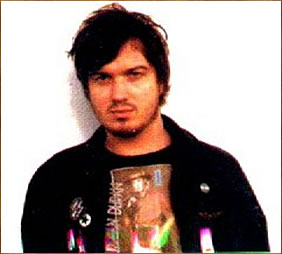
Thomas van Aalten (Huissen, 26 september 1978)
De Oostenrijkse dichter, schrijver en vertaler Christoph W. Bauer werd geboren in Kolbnitz op 26 september 1968. Zie ook mijn blog van 8 juni 2009
Supersonic
XLVI
vorausschauend auch nur revuen sie sahen
was auf sie zu kam waren krummgelaufene
absätze und gerieten im schuhwerk der
geschwister auf die schiefe bahn
erkannten die rückstrahler der zukunft in
elternreden bremslichtern und gaben gas
auf ihren klapprädern strampelten sich aus
fotoalben dem ballast der augenerde
in luftreflexionen verborgen vor sich selbst
als gäbe es sie gar nicht abgeworfen von
predigten ums taschengeld betrogen matthai
am letzten sei dank hörten sie in der messe
wer sein leben findet wird es verlieren

Christoph W. Bauer (Kolbnitz, 26 september 1968)
De Engelse schrijver Mark Haddon werd geboren op 26 september 1962 in Northampton. Hij volgder een opleiding aan de Uppingham School en het Merton College, Oxford, waar hij studeerde Engels. In 2003 won Haddon de Whitbread Book of the Year Award en in 2004 de Commonwealth Writers’ Prize Overall Best First Book voor zijn roman The Curious Incident of the Dog in the Night-time, een boek dat is geschreven vanuit het perspectief van een jongen met het syndroom van Asperger. Zijn tweede roman, A Spot of Bother, werd gepubliceerd in september 2006. Mark Haddon is ook bekend om zijn reeks van Agent Z boeken. Van een ervan, Agent Z en de Pinguïn van Mars, werd in 1996 een BBC sitcom voor kinderen gemaakt.
Uit: The Curious Incident of the Dog in the Night-Time
„It was 7 minutes after midnight. The dog was lying on the grass in the middle of the lawn in front of Mrs Shears’ house. Its eyes were closed. It looked as if it was running on its side, the way dogs run when they think they are chasing a cat in a dream. But the dog was not running or asleep. The dog was dead. There was a garden fork sticking out of the dog. The points of the fork must have gone all the way through the dog and into the ground because the fork had not fallen over. I decided that the dog was probably killed with the fork because I could not see any other wounds in the dog and I do not think you would stick a garden fork into a dog after it had died for some other reason, like cancer for example, or a road accident. But I could not be certain about this.
I went through Mrs Shears’ gate, closing it behind me. I walked onto her lawn and knelt beside the dog. I put my hand on the muzzle of the dog. It was still warm.
The dog was called Wellington. It belonged to Mrs Shears who was our friend. She lived on the opposite side of the road, two houses to the left.
Wellington was a poodle. Not one of the small poodles that have hairstyles but a big poodle. It had curly black fur, but when you got close you could see that the skin underneath the fur was a very pale yellow, like chicken.
I stroked Wellington and wondered who had killed him, and why.“
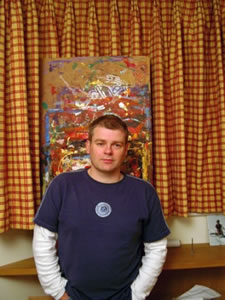
Mark Haddon (Northampton, 26 september 1962)
De Engelse schrijver, criticus en columnist William Self werd geboren in Londen op 26 september 1961. Zie ook mijn blog van 26 september 2007 en ook mijn blog van 26 september 2008. en ook mijn blog van 26 september 2009.
Uit: The Book of Dave
„The little kids who’d left the manor with Carl had run on ahead, up the slope towards the Layn, the avenue of trees that formed the spine of Ham. These thick-trunked, stunted crinkleleafs bordered the cultivated land with a dark, shimmering froth. Carl saw brown legs, tan T-shirts and mops of curly hair flashing among the trunks as the young Hamsters scattered into the woodland. Reedy whoops of joy reached Carl’s ears, and he wished he could go with them into Norfend, galumphing through the undergrowth, sloshing into the boggy hollows to flush out the motos, then herd them towards their wallows.
Up from the manor in a line behind Carl came the older lads – those between ten and fourteen years old – whose graft it was to oversee the motos’ wallowing, before assigning the beasts their day’s toil. Despite everything, Carl remained the acknowledged gaffer of this group, and, as he swerved off the path along one of the linchets dividing the rips, the other eight followed suit, so that the whole party were walking abreast, following the bands of wheatie as they rolled up the rise.“

William Self (Londen, 26 september 1961)
De Amerikaanse schrijfster Jane Smiley werd geboren op 26 september 1949 in Los Angeles. Zie ook mijn blog van 26 september 2008 en ook mijn blog van 26 september 2009.
Uit: A Thousand Acres
„At sixty miles per hour, you could pass our farm in a minute, on County Road 686, which ran due north into the T intersection at Cabot Street Road. Cabot Street Road was really just another country blacktop, except that five miles west it ran into and out of the town of Cabot. On the western edge of Cabot, it became Zebulon County Scenic Highway, and ran for three miles along the curve of the Zebulon River, before the river turned south and the Scenic continued west into Pike. The T intersection of CR 686 perched on a little rise, a rise nearly as imperceptible as the bump in the center of an inexpensive plate.
From that bump, the earth was unquestionably flat, the sky unquestionably domed, and it seemed to me when I was a child in school, learning about Columbus, that in spite of what my teacher said, ancient cultures might have been onto something. No globe or map fully convinced me that Zebulon County was not the center of the universe. Certainly, Zebulon County, where the earth was flat, was one spot where a sphere (a seed, a rubber ball, a ballbearing) must come to perfect rest and once at rest must send a taproot downward into the ten-foot-thick topsoil.
Because the intersection was on this tiny rise, you could see our buildings, a mile distant, at the southern edge of the farm. A mile to the east, you could see three silos that marked the northeastern corner, and if you raked your gaze from the silos to the house and barn, then back again, you would take in the immensity of the piece of land my father owned, six hundred forty acres, a whole section, paid for, no encumbrances, as flat and fertile, black, friable, and exposed as any piece of land on the face of the earth.
If you looked west from the intersection, you saw no sign of anything remotely scenic in the distance. That was because the Zebulon River had cut down through topsoil and limestone, and made its pretty course a valley below the level of the surrounding farmlands. Nor, except at night, did you see any sign of Cabot. You saw only this, two sets of farm buildings surrounded by fields. In the nearer set lived the Ericsons, who had daughters the ages of my sister Rose and myself, and in the farther set lived the Clarks, whose sons, Loren and Jess, were in grammar school when we were in junior high. Harold Clark was my father’s best friend. He had five hundred acres and no mortgage. The Ericsons had three hundred seventy acres and a mortgage.“

Jane Smiley (Los Angeles, 26 september 1949)
De Russische schrijver en dissident Vladimir Nikolajevitsj Vojnovitsj werd geboren in Doesjanbe op 26 september 1932. Zie ook mijn blog van 26 september 2008 en ook mijn blog van 26 september 2009.
Uit: Die denkwürdigen Abenteuer des Soldaten Iwan Tschonkin (Vertaald door Alexander Kaempfe)
„Ob das auf den Seiten dieses Buches Erzählte wirklich geschehen ist oder nicht, kann man heute nicht mehr mit Sicherheit sagen. Der Vorfall, mit dem die ganze Geschichte (die sich fast bis in unsere Tage hinzieht) ihren Anfang nahm, spielte sich im Dorf Krassnoje vor so langer Zeit ab, daß fast keine Augenzeugen übriggeblieben sind. Diese wenigen erzählen die Geschichte verschieden und einige können sich überhaupt nicht mehr daran erinnern. Um die Wahrheit zu sagen, war dieser Vorfall auch nicht wichtig genug, um ihn so lange im Gedächtnis zu behalten. Ich jedoch habe alles zusammengetragen, was ich zu dieser Sache in Erfahrung brachte. Dann habe ich von mir aus noch einiges hinzugefügt, vielleicht mehr als ich hörte. Zuletzt erschien mir die Geschichte so unterhaltsam, daß ich mich dazu entschloß, sie aufzuschreiben. Sollte sie Ihnen uninteressant, langweilig oder gar dumm erscheinen, sind Sie natürlich berechtigt, so zu tun, als hätte ich nichts erzählt.
Das nachfolgend Berichtete geschah unmittelbar vor dem Krieg: so etwa Ende Mai oder Anfang Juni 1941.
Es war an einem ganz gewöhnlichen, für die Jahreszeit typischen heißen Tag. Alle Kolchosbauern arbeiteten auf den Feldern, während Njura Beljaschowa, die bei der Post angestellt war und nicht in direkter Beziehung zum Kolchos stand, ihren freien Tag damit verbrachte, im Gemüsegarten Kartoffeln anzuhäufeln.
Es war so heiß, daß Njura schon völlig außer Atem war, als sie drei Beete hinter sich hatte. Ihr Kleid war auf dem Rücken und unter den Achselhöhlen durchgeschwitzt und wurde beim Wiedertrocknen salzig, weiß und hart. Der Schweiß rann ihr in die Augen. Njura richtete sich auf, um das widerspenstige Haar unters Kopftuch zu schieben. Bei dieser Gelegenheit blickte sie zur Sonne hoch, um festzustellen, ob bald Mittag sein würde. Doch Njura bekam die Sonne nicht zu sehen. Ein großer eiserner Vogel mit einem gekrümmten Schnabel hatte sich vor die Sonne und den Himmel geschoben und stürzte direkt auf sie herab.
»O weh!« rief Njura entsetzt, schlug die Hände vors Gesicht und ließ sich wie tot in eine Furche fallen.
Der Eber Borjka, der damit beschäftigt war, die Erde neben dem Haus aufzuwühlen, sprang zur Seite, vergewisserte sich indessen, daß ihm keine Gefahr drohte, und kehrte an seinen alten Platz zurück.“
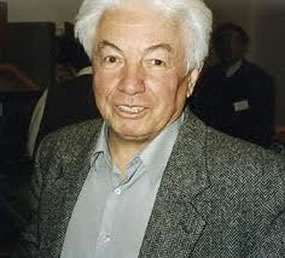
Vladimir Vojnovitsj (Doesjanbe, 26 september 1932)
De Nigeriaanse schrijver Cyprian Ekwensi werd op 26 september 1921 in Nigeria geboren in Minna. Zie ook mijn blog van 26 september 2006 en ook mijn blog van 26 september 2009.
Uit: Jagua Nana
„The sigh was a prayer to God to stay back the years and a challenge to herself to employ all the coquettish arts to help Him. She did not often remember that if her son had lived he would today be roughly as old as her lover. Freddie was hardly more than a boy, with his whole ambitious life before him. He was a teacher at the Nigerian National College who badly wanted to travel overseas to complete his law studies. He had applied for a Government Scholarship, but did not pin his faith on
being selected. She knew Freddie deserved a good girl to marry him, raise his children and ‘shadow’ him in all his ambitions. But Jagua was too much in love with him to make a reasonable exit. And she wanted Freddie as her husband because only a young man would still be strong enough to work and earn when she would be on the decline. Men would not be wanting her in six years’ time, when – even
now – girls of eighteen could be had. At forty-five, she had her figure and her tact to guide her.
She knew that, seen under the dim lights of her favourite night spot, the
Tropicana – from a distance – her face looked beautiful. In any light she was proud of her body, which could model for any painter or sculptor. When she walked down a street, male eyes followed the wiggle of her hips which came with studied unconsciousness. Sometimes she was ashamed of her too passionate love-making, but Freddie did not seem so embarrassed now as he used to be at first. When she painted her face and lifted her breasts and exposed what must be concealed and concealed what must be exposed, she could out-class any girl who did not know what to do with her God-given female talent.“
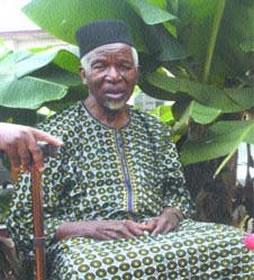
Cyprian Ekwensi (26 september 1921 – 4 november 2007)
De Oostenrijkse schrijver Peter Turrini werd geboren op 26. September 1944 in St. Margarethen im Lavanttal. Zie ook mijn blog van 26 september 2009.
Uit: Die Verhaftung des Johann Nepomuk Nestroy
„Nestroy geht schnell durch das Bühnentürl des Theaters an der Wien, einige Begeisterte stürzen auf ihn zu und bitten ihn, Witze aus dem Stück zu wiederholen. Nestroy antwortet, er könne nur gegen Bezahlung lustig sein, ohne Gage falle ihm nichts ein, und läuft zu einer wartenden Equipage. Er steigt in die Equipage, sie fährt weg. In der Equipage sitzt eine junge, schöne Frau, sein Frau, Wilhemine, geborene Wilhelmine Phillipine von Nespiensi. Sie ist ein paar Jahre jünger als Nestroy, hat volles, rotes Haar, das von einer Kopfhaube kaum gebändigt wird. Die Eheleute haben sich sechs Jahre lang nicht gesehen. Sie werden von der schnellen Fahrt der Equipage durchgerüttelt und starren einander an. Nestroy geht in Gedanken das ganze Arsenal seiner Vorwürfe durch: “Warum hast du mich verlassen?” wird er sie fragen.
(…)
Nestroy sitzt im Kaffeehaus an seinem Stammtisch und trinkt. Der Besitzer des Kaffehauses, Herr Anselm Weidinger, den sie “die Amsel” nennen, schenkt Nestroy aus einer Weinflasche nach. Nestroy trinkt das Glas in einem Zug aus. “Das wievielte war das?” fragt Nestroy den Besitzer. “Das Vierte”, sagt dieser. “Nach meiner Berechnung hab’ ich erst drei getrunken”, sagt Nestroy. “Ich verlaß mich ganz und gar auf die Berechnungen des Herrn Nestroy”, sagt Herr Anselm Weidinger und schenkt ihm das nächste Glas ein. “Erst nach einem Dutzend kann ich vergessen, was für ein Mißerfolg der heutige Abend war”, sagt Nestroy. “Aber Herr von Nestroy”, antwortet Weidinger lachend, “Sie reden von einem Mißerfolg und das Publikum jubelt. Sie sind wirklich der g’spaßigste Mensch von Wien”. Er schenkt ihm ein weiteres Glas ein. Einige Gäste prosten Nestroy zu.“
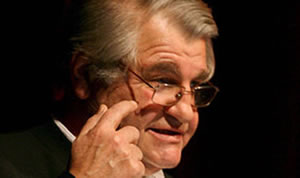
Peter Turrini (St. Margarethen im Lavanttal, 26. September 1944)
De Engels schrijver, dichter en germanist Edwin Keppel Bennett werd geboren op 26 september 1887 in Wareham, Dorset. Hij werd opgeleid aan Elm House School, Wareham en aan de Universiteit van Straatsburg. Hij ging in 1914 naar het Gonville and Caius College, Cambridge, en behaalde zijn BA in 1919 en zijn MA in 1923. In 1923 werd hij ‘onofficiële fellow’ van het college en een Cambridge University lector voor Duits. Officiële fellow werd hij in 1926, in 1931 werd hij Senior Tutor. Dat bleef hij tot hij in 1952 voorzitter van het College werd. Tijdens de Eerste Wereldoorlog diende Bennett in een inlichtingen-eenheid van het Britse leger in de rang van tweede luitenant (1916-1918), vooral in Palestina. Bennetts eerste boek, Built in Jerusalem’s Wall: A Book in praise of Jerusalem, werd gepubliceerd onder het pseudoniem ‘Francis Keppel’ in 1920. Zijn A History of the German “Novelle” from Goethe to Thomas Mann verscheen bij de Cambridge University Press in 1934
The Stranger
The room grows silent, and the dead return:
Whispering faintly in the corridor,
They try the latch and steal across the floor
Towards my chair; and in the hush I turn
Eagerly to the shadows, and discern
The ghosts of friends whom I shall see no more,
Come back, come back from some Lethean shore
To the old kindly life for which they yearn.
How still they are! O, wherefore can I see
No sign of recognition in the eyes
That gaze in mine? Have they forgotten me
Who was their friend? They fade into the gloom;
And on my heart their plaintive murmur dies:
“A stranger now, a stranger fills his room.

Edwin Keppel Bennett (26 september 1887 – 13 juni 1958)
Wareham, Dorset (Geen portret beschikbaar)
De Australische dichter en schrijver Joseph Furphy werd geboren op 26 september 1843 in Yering, een voorstad van Melbourne Yering. Furphy schreef meestal onder het pseudoniem Tom Collins. Zijn vader, een pachter, was in 1840 geëmigreerd uit Tande Ragee in Ierland naar Australië. In 1905 verhuisde Furphy naar West-Australië, waar zijn zonen woonden. Hij bouwde een huis in Swanbourne, een voorstad van Perth, waar nu het hoofdkantoor is van Fellowship of Australian Writers Zijn bekendste werk is Such Is Life, een fictief verhaal over het leven van de plattelandsbevolking, met inbegrip van veedrijvers, krakers en rondtrekkende reizigers in het zuiden van New South Wales en Victoria tijdens de jaren 1880. Het boek bevat een reeks losjes verwante verhalen van verschillende mensen die de verteller ontmoet op zijn reis door het land. De titel zou zijn afgeleid van de laatste woorden van de beroemdste straatrover van Australë: Ned Kelly.
Uit: Such is Life
„Unemployed at last!
***
Scientifically, such a contingency can never have befallen of itself. According to one theory of the Universe, the momentum of Original Impress has been tending toward this far-off, divine event ever since a scrap of fire-mist flew from the solar centre to form our planet. Not this event alone, of course; but every occurrence, past and present, from the fall of captured Troy to the fall of a captured insect. According to another theory, I hold an independent diploma as one of the architects of our Social System, with a commission to use my own judgment, and take my own risks, like any other unit of humanity. This theory, unlike the first, entails frequent hitches and cross-purposes; and to some malign operation of these I should owe my present holiday.
Orthodoxly, we are reduced to one assumption: namely, that my indomitable old Adversary has suddenly called to mind Dr. Watts’s friendly hint respecting the easy enlistment of idle hands.
Good. If either of the two first hypotheses be correct, my enforced furlough tacitly conveys the responsibility of extending a ray of information, however narrow and feeble, across the path of such fellow-pilgrims as have led lives more sedentary than my own—particularly as I have enough money to frank myself in a frugal way for some weeks, as well as to purchase the few requisites of authorship.
If, on the other hand, my supposed safeguard of drudgery has been cut off at the meter by that amusingly short-sighted old Conspirator, it will be only fair to notify him that his age and experience, even his captivating habits and well-known hospitality, will be treated with scorn, rather than respect, in the paragraphs which he virtually forces me to write; and he is hereby invited to view his own feather on the fatal dart.
Whilst a peculiar defect—which I scarcely like to call an oversight in mental construction—shuts me out from the flowery pathway of the romancer, a co-ordinate requital endows me, I trust, with the more sterling, if less ornamental qualities of the chronicler. This fairly equitable compensation embraces, I have been told, three distinct attributes: an intuition which reads men like sign-boards; a limpid veracity; and a memory which habitually stereotypes all impressions except those relating to personal injuries.
Submitting, then, to the constitutional interdict already glanced at, and availing myself of the implied license to utilise that homely talent of which I am the bailee, I purpose taking certain entries from my diary, and amplifying these to the minutest detail of occurrence or conversation. This will afford to the observant reader a fair picture of Life, as that engaging problem has presented itself to me.“
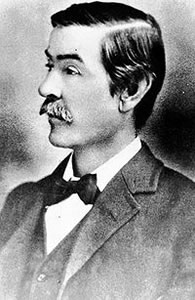
Joseph Furphy (26 september 1843 – 13 september 1912)
De Braziliaanse schrijver Luís Fernando Veríssimo werd geboren op 26 september 1936 in Porto Alegre, Rio Grande do Sul. Veríssimo is de zoon van de Braziliaanse schrijver Erico Veríssimo en woonde in zijn jeugd samen met zijn vader in de Verenigde Staten. Veríssimo is een grote fan van jazz, en speelt zelf saxofoon in een band genaamd Jazz 6. Net als veel andere Braziliaanse intellectuelen geniet hij van de cultuur van Rio de Janeiro. Veríssimo is een criticus van rechtse politici, vooral van de voormalige president, Fernando Henrique Cardoso. Verder is Veríssimo dol op voetbal en heeft hij ook veel teksten geschreven over deze passie.
Uit: Borges and the Eternal Orangutans (Vertaald door Jull Costa)
„I will try to be your eyes, Jorge. I am following the advice you gave me when we said goodbye: “Write, and you will remember.” I will try to remember, with more exactitude this time, so that you can see what I saw, so that you can unveil the mystery and arrive at the truth. We always write in order to remember the truth. When we invent, it is only in ordeto remember the truth more exactly.
Geography is destiny. If Buenos Aires were not so close to Porto Alegre, none of this would have happened, but I did not see that I was being subtly summoned or that this story needed me in order to be written. I did not see that I was being plunged headfirst into the plot, like a pen into an inkwell.
The circumstances of my visit to Buenos Aires were, as I now know, planned with all the care of someone setting a trap for a particular animal. At the time, however, enthusiasm blinded me to this. I did not realise that I had been chosen as an accessory to a crime, as neutral and innocent as the mirrors in a room.
The 1985 Israfel Society Conference, the first meeting of Edgar Allan Poe specialists to be held outside the northern hemisphere, was to take place in Buenos Aires, less than a thousand kilometres from my apartment in Bonfim, and was, therefore, within the budget of a poor translator and teacher of English (which, as you know, is what I am). One of the invited speakers was to be Joachim Rotkopf, who was to lecture on the origins of European surrealism to be found in Poe’s work, precisely the topic that had provoked the controversy with Professor Xavier Urquiza from Mendoza, and that had kept me so amused in the pages of The Gold-Bug, the Society journal. All this seemed to me a mere accumulation of happy and irresistible coincidences. I decided not to resist. At least, I thought I decided.“
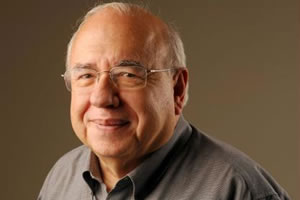
Luís Fernando Veríssimo (Porto Alegre, 26 september 1936)
